Eight of the 18 initial recommendations from the council formed to address classroom conditions in Nova Scotia will be immediately implemented, according to a government press release.

READ MORE: Nova Scotia classroom conditions council off to good start: teacher
The 14-member Council to Improve Classroom Conditions, created as part of the new contract imposed by the government on the province’s 9,300 public school teachers last month, made the 18 recommendations after three days of talks held last week.
The eight recommendations to be implemented are:
- Eliminating three provincially mandated assessments and exams.
- A five-year moratorium on new school board and provincially initiated assessments.
- Maintaining the suspension of Grade 10 exams, but teachers may request to use an exam if they wish
- Maintain the suspension of one provincially mandated assessment.
- Issuing a directive to school boards about PowerSchool regarding marks, effective April 3.
- Issuing a directive to school boards about PowerSchool with regards to attendance, effective April 3.
- Issuing a directive to school boards about PowerSchool regarding outcomes, effective April 3.
- Preparing and sharing a summary of council discussions and recommendations.
WATCH: After an initial round of meetings, the Council to Improve Classroom Conditions already has 18 recommendations to improve classroom conditions in Nova Scotia. Jennifer Grudic reports.

“Initially, they [the council] have some decisions that we believe will make a difference for teachers,” said Education Minister Karen Casey in an interview with reporters Wednesday.
She said one of the issues teachers expressed “very clearly to us” was the amount of time it can take to do things in the classroom that they believe don’t relate to the instruction of students.

Get breaking National news
“If we can clear some of that away, and free up some of that teacher time so it can be spent directly with instruction to students, that’s the goal here and we believe these changes will give them more time,” Casey said.
She added the eight changes to be implemented will have no cost.
In a release Wednesday, Casey said in addition to the eight recommendations being implemented, the other 10 are in progress.
Some of the recommendations in progress, according to the government release, include giving more time for teachers to respond to emails, preparation of Individual Program Plans, and looking at the timing of pupil evaluation, classification and administrative days. The release goes on to say many of these recommendations require information and options to be presented by the department and school boards at the council’s next meeting.
Nova Scotia Teachers Union president Liette Doucet said in a release that there were “positive gains” made.
“The current suspension of a variety of provincial assessments has given teachers greater freedom to use their professional judgment in assessing students,” Doucet said.
Casey said in the fall they heard from teachers about issues with the assessments, and the government chose to suspend all assessments “for the balance of this year,” and then it came to the council for review.
“The big question is: Are we asking for more than one assessment that will give us the same data?” Casey said.
She said the council has also asked the school boards to do a business case surrounding the value of certain assessments.
But Doucet said there are still issues being faced by teachers, and that the government “is dragging its feet.”
“Major reforms like reduced class sizes and increased support for students with special needs are badly needed and have not been addressed,” Doucet said. “These reforms will require greater investment than what the current government has allocated to the council.”
READ MORE: Nova Scotia classroom conditions council members chosen in wake of Bill 75
An initial report from the council is expected by April 28 and a full list of the recommendations can be found online.
The council has a budget of $20 million over two years to address the issues brought up.
- Michael Kovrig reflects on ‘brutally hard’ Chinese detention: ‘You’re totally alone’
- TD Bank moves to seize home of Russian-Canadian jailed for smuggling tech to Kremlin
- U.S. moves to ban Chinese software, hardware from all vehicles in America
- Conservatives set to table non-confidence motion Tuesday. What to expect








Comments